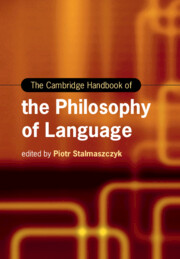Book contents
- The Cambridge Handbook of the Philosophy of Language
- Cambridge Handbooks in Language and Linguistics
- The Cambridge Handbook of the Philosophy of Language
- Copyright page
- Contents
- Figures
- Tables
- Contributors
- Preface
- 1 Philosophy of Language: Definitions, Disciplines, and Approaches
- Part I The Past, Present, and Future of Philosophy of Language
- Part II Some Foundational Issues
- 5 Philosophy of Language, Ontology, and Logic
- 6 Frege’s Legacy in the Philosophy of Language and Mind
- 7 Metasemantics and Metapragmatics: Philosophical Foundations of Meaning
- 8 Internalist Perspectives on Language
- 9 Semantic Content and Utterance Context: A Spectrum of Approaches
- 10 Semantic Minimalism and Contextualism in Light of the Logicality of Language
- Part III From Truth to Vagueness
- Part IV Issues in Semantics and Pragmatics
- Part V Philosophical Implications and Linguistic Theories
- Part VI Some Extensions
- References
- Index
8 - Internalist Perspectives on Language
from Part II - Some Foundational Issues
Published online by Cambridge University Press: 12 November 2021
- The Cambridge Handbook of the Philosophy of Language
- Cambridge Handbooks in Language and Linguistics
- The Cambridge Handbook of the Philosophy of Language
- Copyright page
- Contents
- Figures
- Tables
- Contributors
- Preface
- 1 Philosophy of Language: Definitions, Disciplines, and Approaches
- Part I The Past, Present, and Future of Philosophy of Language
- Part II Some Foundational Issues
- 5 Philosophy of Language, Ontology, and Logic
- 6 Frege’s Legacy in the Philosophy of Language and Mind
- 7 Metasemantics and Metapragmatics: Philosophical Foundations of Meaning
- 8 Internalist Perspectives on Language
- 9 Semantic Content and Utterance Context: A Spectrum of Approaches
- 10 Semantic Minimalism and Contextualism in Light of the Logicality of Language
- Part III From Truth to Vagueness
- Part IV Issues in Semantics and Pragmatics
- Part V Philosophical Implications and Linguistic Theories
- Part VI Some Extensions
- References
- Index
Summary
The division between internalist and externalist perspectives has dominated many areas of philosophy over the last few decades. In broadest terms, the issue is how best to individuate or otherwise categorize properties of agents that bear upon them being rational, perceiving, acting creatures. Are the properties internal to the agent, to the exclusion of external factors, or are they essentially involving of properties and things external to the agents? In the philosophy of language, the relevant properties pertain to general linguistic competence, and so we may ask if language itself (appropriately understood) is an internal property of speaker-hearers, or, say, if a word’s meaning is essentially world involving. Only a cursory survey of internalism in the philosophy of language would be possible in the space available; the chapter’s ambition, instead, is to offer something of a rapprochement.
- Type
- Chapter
- Information
- The Cambridge Handbook of the Philosophy of Language , pp. 157 - 173Publisher: Cambridge University PressPrint publication year: 2021
- 3
- Cited by

